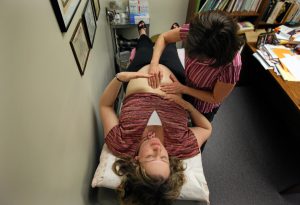A Woman’s Perspective: Risky Business: When a Pregnancy is High Risk

What is meant by a high-risk pregnancy?
High risk is an interesting term in medicine that needs “for whom” clarification when used — the patient, the baby, or the provider? Certainly, most of us can agree that some things are risky, and pregnancy and delivery are actually the riskiest things a woman can do. Risks include bleeding (hemorrhage) and high blood pressure that can cause problems in the mom and growth issues in the baby.
A pregnancy is called high-risk if a woman or her baby has an increased chance of a health problem. Just because a woman is told she has a high-risk pregnancy, however, this doesn’t mean she or her baby will have problems. It simply means her health-care team will be monitoring her pregnancy for specific health situations. A woman who is told she has a high-risk pregnancy will usually have more visits and screenings with her doctor during her pregnancy than a woman who does not have a high-risk pregnancy. She may have more ultrasound tests to make sure that her baby is developing well, as well.
If you look at the causes of maternal mortality in the State of California compared with the country as a whole, California is one of the safest states for childbirth. Data from the California Maternal Quality Care Collaborative shows a decline in California’s maternal mortality rate since 2009. It also states the risks that contribute most to maternal death are hemorrhage and hypertension.
While not all healthcare providers and hospitals share the same opinions in defining high-risk pregnancies and deliveries, they all agree there are conditions that put a woman and her baby at a higher risk for problems. In general, a woman’s pregnancy is referred to as high-risk if one or more of the following is present: multiple gestations (such as twins), history of multiple miscarriages, diabetes, high blood pressure, kidney disease, and alcohol or drug dependency.
Another high-risk indicator is the age of the mom, particularly if she is younger than 17 or older than 35. This seems a bit arbitrary because as we continue to live longer and healthier lives, we are in better shape to have babies later in life. Further, if age is a good representation of health, is a reference to biologic, physiologic, or mental age? Although to many, age is used as a risk factor, age does not seem to be a risk factor unless something else is present.
When a woman is an appropriate candidate for a vaginal birth after a C-section (also known as a VBAC), there’s a 70 to 75 percent chance she will succeed regardless of the reason she underwent her first cesarean. Attempting a vaginal birth after C-section is called a trial of labor after cesarean (TOLAC). The key to success is the full commitment and support of a woman’s goal by her health-care provider and team.
A successful vaginal birth after a C-section allows a woman to avoid another scar on her uterus as well as the risk of infection associated with abdominal C-section surgery. There is less pain after a VBAC delivery than with a C-section, fewer days in the hospital recovering and a shorter recovery time at home. In addition, VBAC provides a more active role for the woman and her birthing partner in the birth of their child.
